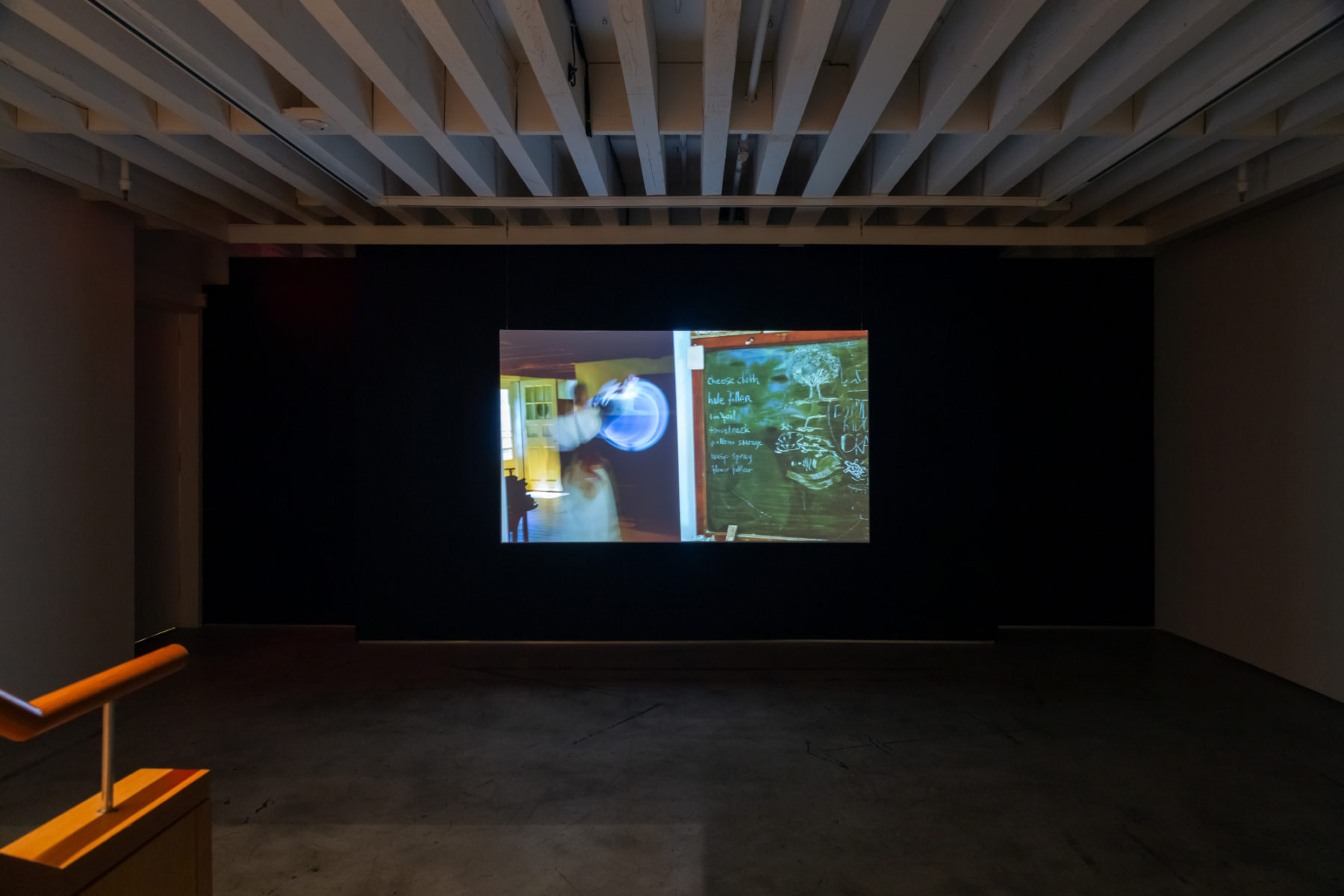Through May 11 at The Drawing Center, two new films by Ericka Beckman, Stalk (2024) and Study for Rapunzel-The Game (2025), will screen on a continuous loop in the basement gallery, just beneath a mini-retrospective of her drawings. Comprising production sketches, storyboards, and finished compositions, Beckman’s drawings provide a special insight into the conceptual bases and aesthetic development of her films, which use primary colors, simplified forms, and labor-intensive animation techniques to examine how our current economic structures not only control the material conditions of our lives, but also inform human cognitive development and memory formation.
Initially conceived and staged as a live performance in Brooklyn Bridge Park for Performa 2021, Stalk uses the familiar narrative of a fairytale (Jack and the Beanstalk) to examine the devastating effects of monopolistic agribusiness on independent farmers and the land itself. Confronted with a chorus of farmers concerned with the health of their crops amidst a drought, Jack ascends the vine, providing the rain needed for the crops to rise from the earth and Jack's stock to rise with it. Transformed into a savvy investor, Jack then shorts the stock, leaving the farmers scrambling. Unified by Beckman’s score of rhythmic, narrative songs recalling children’s movies—another unifying feature of her filmography—the film culminates in a mesmerizing animated sequence of large colorful pinwheels suggestive of wind turbines. Perhaps the very air we breathe will be the next target of capitalist speculation.
Beckman’s valuation of contemporary life as a betting game where the house always wins is a leitmotif in her oeuvre best exemplified by her 1983 film You the Better, where a group of players engage in a sport-like game of chance with vague rules and constantly changing objectives for points that appear to correlate to houses, invoking the unrelenting demand for real estate development. Shot on 16mm in the black box space of Beckman's rent-controlled, live-work space in Lower Manhattan, the film became a prescient predecessor to her meditation on the long-term consequences of Reaganomics in her 2020 film Reach Capacity, which was developed amidst a legal battle to retain the lease on her studio after the building became a developer's object of desire; around the same time, Beckman was periodically traveling to St. Louis to care for a parent and observed the Federal government's destruction of a historically Black neighborhood, downtown North St. Louis, when they forced residents to accept lowball buyouts of their homes, which were then razed to build a military-intelligence surveillance hub. A preparatory drawing for You the Better is The Power of the Spin (1982), where a churning wave spins a roulette-like wheel on which minuscule figures attempt to keep their balance while vying for the flag at its center—an apt metaphor for capitalist expansion radiating from an imperial core. Serving as the exhibition’s title, the phrase points to the pinwheels of Stalk and the beating heart of Study for Rapunzel, a spinning, spectral, conch-like form held aloft by a young woman in the basement of an idyllic country cottage.
Guided by the ambient sounds of John Zorn’s “Clavicle of Solomon,” the film constructs a coded sequence of acts between two women, one young and one old, as they move about the cottage and manipulate various everyday objects. The relationship between bodily movement, material object, and human cognition is another recurring conceptual framework in Beckman’s career, originally drawn from Jean Piaget’s theories of early childhood development in Genetic Epistemology (1970). Beckman’s career-spanning interest in fairy tales is best understood in this context, as they not only provide a structure for critiquing social norms but also evoke the childhood memories of the viewer. Henri Bergson is another important thinker for Beckman, and his concept of contraction memory, wherein a multitude of single moments coalesce into a living perception of the world, is particularly relevant to her films.
As the title indicates, Rapunzel is a study for Beckman’s current project, which will use elements of the fairytale to examine the impact of AI on our understanding of how the human mind transmutes the stimuli of experience into a subjective consciousness. Notably, the formal basis for the spinning tributaries of light wielded by the young woman in Study for Rapunzel is one of nature’s compositions, a tree branch Beckman painted white, mounted on a rotating mechanism, and filmed using a long exposure. The resulting image thus only exists in the fourth dimension—a drawing made in time and space.
Beckman’s exhibition serves as an unlikely complement to the show in the main gallery, “John Zorn: Hermetic Cartography,” a presentation focused on the avant-garde jazz musician’s intimate, delicately wrought abstractions and idiosyncratic musical scores. In a darkened side gallery, we find particular resonance with Beckman’s oeuvre in Zorn’s props for his Theatre for Musical Optics, a series of performances wherein a small, select group of observers would gather at his apartment at midnight to watch him arrange small found and constructed objects in a specific sequence in his attempt to create “music without sound.” Presented in a horizontal vitrine, the brightly colored array of trinkets terminates with a cassette tape of Zorn’s Requiem for Jack Smith, another artist whose handmade aesthetic, childhood obsessions, and downtown loft space comprised the primary components of his groundbreaking films and performances, some of which also took issue with landlords (notably, once Beckman lived in the Greene Street loft where Smith filmed Flaming Creatures). While we will have to wait for the finished Rapunzel to find out what Beckman sees in a post-AI future, Power of the Spin provides a wealth of troubling, if poetic, thoughts about our present.
Ericka Beckman: Power of the Spin is on view through May 11 at The Drawing Center.


